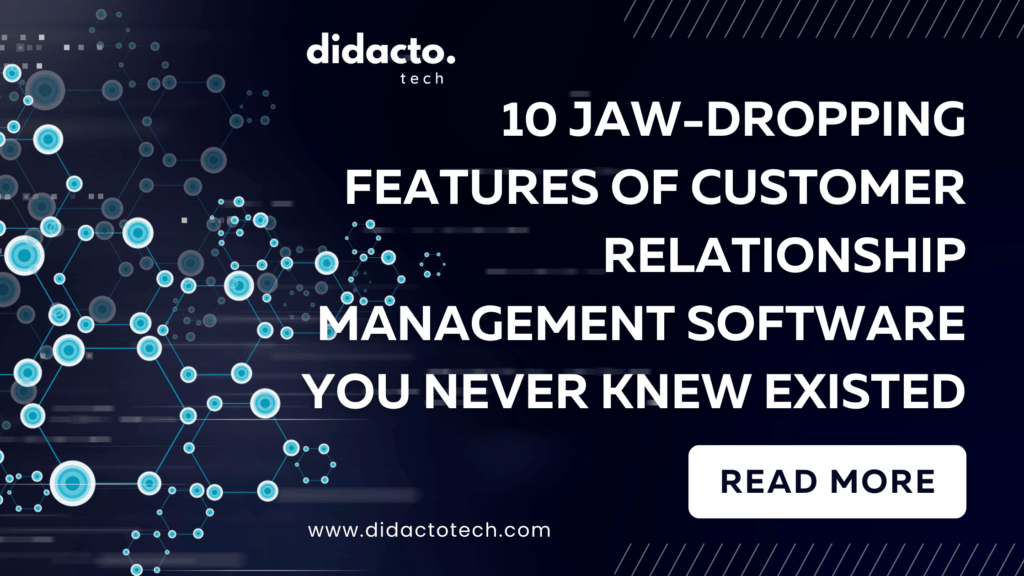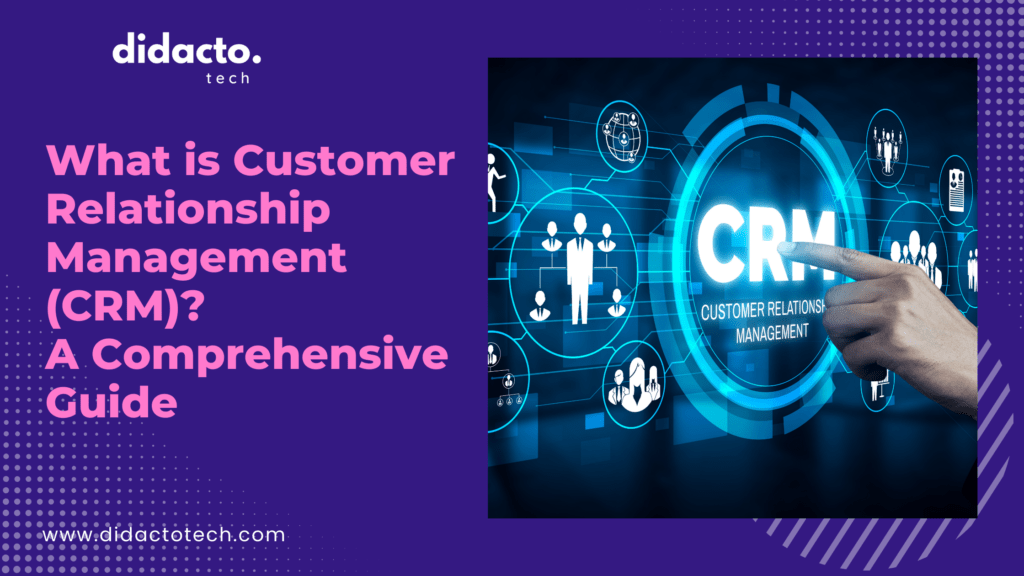Beyond the Basics: 10 Surprising Capabilities of Modern CRM Software
Table of Contents
1. Artificial Intelligence-Powered Insights
1.1. Predictive Customer Behavior Analysis
Modern CRM systems now use AI algorithms to analyze historical customer data and predict future behaviors. This feature helps businesses anticipate customer needs and tailor their strategies accordingly. For example, a retail company might use this to forecast which products a customer is likely to purchase next, enabling personalized marketing campaigns.
1.2. Automated Lead Scoring and Prioritization
AI-driven lead scoring systems assess and rank potential customers based on their likelihood to convert. This allows sales teams to focus their efforts on the most promising leads. The system considers factors such as engagement level, company size, and past interactions to assign scores automatically.
1.3. Smart Recommendations for Next Best Actions
CRM software now offers intelligent suggestions for the next steps in customer interactions. These recommendations are based on successful past scenarios and current customer data. For instance, the system might suggest the best time to follow up with a lead or recommend specific product offerings based on the customer’s profile.
2. Advanced Data Visualization Tools
2.1. Interactive Dashboards for Real-Time Monitoring
Modern CRM platforms feature dynamic dashboards that update in real-time. These visual representations of data allow teams to monitor key performance indicators at a glance. Users can often customize these dashboards to display the metrics most relevant to their roles.
2.2. Customizable Reports with Drag-and-Drop Features
Many CRM systems now offer intuitive report builders with drag-and-drop functionality. This allows users to create complex reports without needing technical expertise. Teams can easily generate visual representations of data to share insights across the organization.
2.3. Geospatial Mapping for Territory Management
CRM software now incorporates mapping features for better territory management. Sales teams can visualize customer locations, plan routes, and identify areas of opportunity. This spatial analysis can reveal patterns and help optimize resource allocation.
3. Seamless Integration with Internet of Things (IoT) Devices
3.1. Real-Time Data Collection from Connected Products
CRM systems can now collect data directly from IoT-enabled products. This provides businesses with real-time insights into product usage and performance. For example, a manufacturer could monitor equipment performance and predict maintenance needs before issues arise.
3.2. Proactive Maintenance Alerts and Scheduling
By integrating IoT data, CRM software can generate automatic alerts for potential issues and schedule maintenance proactively. This reduces downtime and improves customer satisfaction. The system can even dispatch technicians automatically when certain conditions are met.
3.3. Usage-Based Pricing and Billing Models
IoT integration enables companies to implement usage-based pricing models. The CRM system can track product usage in real-time and generate billing accordingly. This opens up new revenue streams and allows for more flexible pricing strategies.
4. Voice-Activated CRM Functionality
4.1. Hands-Free Data Entry and Retrieval
Voice recognition technology in CRM systems allows users to input and access data hands-free. This is particularly useful for field sales representatives who can update records or retrieve information while on the go.
4.2. Voice-Controlled Reporting and Analytics
Users can now generate reports or access analytics using voice commands. This feature makes it easier to quickly obtain insights without navigating through complex menus or interfaces.
4.3. Integration with Virtual Assistants for Task Management
CRM platforms are increasingly integrating with virtual assistants like Siri or Alexa. This allows users to manage tasks, set reminders, or schedule appointments using voice commands, even when they’re not directly interacting with the CRM interface.
5. Social Media Listening and Engagement
5.1. Sentiment Analysis Across Multiple Platforms
Advanced CRM systems can now monitor social media platforms and analyze sentiment in real-time. This helps businesses understand public perception and respond quickly to emerging trends or issues.
5.2. Automated Response Suggestions for Customer Inquiries
CRM software can now suggest appropriate responses to customer inquiries on social media. These suggestions are based on the context of the conversation and past successful interactions, helping maintain consistency in customer communication.
5.3. Influencer Identification and Relationship Management
Some CRM systems can identify influential individuals within a company’s network or industry. This feature helps businesses build and manage relationships with key influencers, potentially leading to new opportunities or partnerships.
6. Augmented Reality (AR) for Sales and Support
6.1. Virtual Product Demonstrations and Customizations
AR features in CRM software allow sales teams to offer virtual product demonstrations. Customers can visualize products in their own environment or customize features in real-time, enhancing the sales process.
6.2. AR-Assisted Field Service and Troubleshooting
Field service technicians can use AR features for remote assistance. The CRM system can overlay instructions or schematics in the technician’s field of view, improving efficiency and accuracy in repairs.
6.3. Interactive Training Modules for Sales Teams
AR technology can create immersive training experiences for sales teams. New employees can practice customer interactions or product demonstrations in a virtual environment, accelerating the onboarding process.
7. Blockchain-Based Customer Identity Management
7.1. Secure and Decentralized Customer Data Storage
Some CRM systems now use blockchain technology to store customer data securely. This decentralized approach enhances data security and gives customers more control over their personal information.
7.2. Transparent Loyalty Programs and Reward Systems
Blockchain integration allows for more transparent and secure loyalty programs. Customers can easily track their rewards, and businesses can ensure the integrity of their loyalty systems.
7.3. Simplified Compliance with Data Protection Regulations
Blockchain-based CRM systems can help businesses comply with data protection regulations more easily. The immutable nature of blockchain provides a clear audit trail of data usage and consent.
8. Emotional Intelligence and Mood Detection
8.1. Analysis of Customer Emotions in Text and Voice Interactions
Advanced CRM systems can now analyze the emotional content of customer interactions, whether in text or voice form. This helps businesses understand customer sentiment more accurately and respond appropriately.
8.2. Personalized Communication Based on Emotional State
Using emotional intelligence features, CRM software can suggest personalized communication strategies based on a customer’s emotional state. This allows for more empathetic and effective customer interactions.
8.3. Early Warning Systems for Customer Dissatisfaction
By tracking emotional patterns over time, CRM systems can alert businesses to potential customer dissatisfaction before it escalates. This allows for proactive intervention and improved customer retention.
9. Collaborative CRM Features for Remote Teams
9.1. Virtual Meeting Rooms with Integrated CRM Data
Modern CRM platforms often include virtual meeting spaces where teams can collaborate remotely. These spaces integrate relevant CRM data, allowing for more productive discussions and decision-making.
9.2. Real-Time Document Collaboration and Version Control
CRM systems now offer real-time document collaboration features. Team members can work on the same document simultaneously, with automatic version control to track changes and maintain consistency.
9.3. Cross-Functional Workflow Management and Tracking
Advanced CRM software includes workflow management tools that span different departments. This allows for better coordination between sales, marketing, and customer service teams, ensuring a seamless customer experience.
10. Advanced Customer Journey Mapping
10.1. Multi-Channel Touchpoint Tracking and Analysis
Modern CRM systems can track customer interactions across multiple channels, providing a comprehensive view of the customer journey. This helps businesses understand how different touchpoints contribute to the overall customer experience.
10.2. Personalized Customer Experience Orchestration
Using insights from customer journey mapping, CRM software can help orchestrate personalized experiences for each customer. This might involve tailoring communication channels, content, or offers based on individual preferences and behaviors.
10.3. AI-Driven Customer Lifecycle Predictions
AI algorithms in CRM systems can now predict key moments in the customer lifecycle, such as when a customer is likely to churn or be ready for an upsell. This allows businesses to intervene at the right moment to maximize customer lifetime value.
Summary
The capabilities of modern CRM software extend far beyond basic contact management. From AI-powered insights to blockchain-based identity management, these advanced features are transforming how businesses interact with their customers. As technology continues to evolve, we can expect CRM systems to become even more sophisticated, offering new ways to enhance customer relationships and drive business growth.
Frequently Asked Questions
How do these advanced CRM features benefit businesses?
These features help businesses better understand their customers, personalize interactions, and make data-driven decisions. They can lead to improved customer satisfaction, increased sales, and more efficient operations.
Are these features available in all CRM software?
Not all CRM systems offer these advanced features. They are typically found in more sophisticated, enterprise-level solutions. However, as technology progresses, we’re seeing more of these features become available in mid-range CRM products as well.
What are the implementation challenges for these advanced CRM capabilities?
Implementation challenges can include data integration issues, user adoption, and the need for specialized training. Additionally, some features may require significant computational resources or specialized hardware.
How can companies ensure data privacy and security with these features?
Companies should choose CRM providers with strong security measures and ensure compliance with data protection regulations. Features like blockchain-based identity management can also enhance data security.
What is the future of CRM software development?
The future of CRM is likely to involve even more AI integration, improved predictive capabilities, and enhanced personalization. We may also see more integration with emerging technologies like virtual and augmented reality.



